Having had my school year come to an end a few weeks ago, I've been getting back into doing wiki work here on the Giant Bomb and I've noticed a bit of an issue: There are a lot of Japanese games that have no release date information. Considering the comparative lack of English coverage of Japanese games in most Western media outlets, this isn't much of a surprise and is probably to be expected. It's gotten to be less of an issue with more recent games, even those that still manage to never get localized, but it's still noticeable and it's especially widespread with older, pre-PS2-era games. Even if release date data tends to be one of the less glorified aspects of GB's database, it's nice to have for the sake of complete records and other archival reasons. To that end, I thought I would take the time to do a run-down of how you can look up these release dates for Japanese games using a few different Japanese databases. This is specifically tailored towards those who don't speak or write Japanese; if you can already do those things, you're already perfectly capable of looking up this data yourself. If you've got additional questions or suggestions, then feel free to say so in the comments. I'm open to revisions!
Before You Set Out
Naturally, in this "age of the Internet" and "Web 2.0" and all, you don't necessarily need to make a whole lot of preparations before setting out on your release date research. However, a few things are still handy to have before you set out, so let's quickly outline both essential and optional things, as well as how they'll be of good use to you.Necessary Materials
- Have East Asian language support installed on your computer. This should be mostly a given, but every now and again, I still get messages from people saying something like, "Pepsi, every time you write Japanese all I see are boxes. I love boxes, but I know there's more to Japanese, right?" While there are characters in Japanese that essentially consist of pure boxes, there are indeed way more that aren't just that. So for the purpose of at least seeing the text rendered on your screen correctly, especially for reasons that will be outlined later on in this guide, it's highly recommended that you install text rendering support for Japanese on your computer if you haven't done so. The actual steps depend on your operating system, but given the language's popularity, it shouldn't be hard to Google them. At least in the case of older Windows operating systems, though, you might need an installation disk, so bear that in mind.
- Access to the Japanese game's title in... Japanese. This is also something that should be very obvious, but in the event that you can't actually write Japanese, you're naturally going to need to find the text of whatever game you're looking up in its original Japanese, ideally in a format that you can copy and paste into search boxes. Places like Wikipedia should be a good resource, as a lot of the Japanese games that are in the English version either have the Japanese title in parentheses or a Japanese version of the article that just has the title in nice and big boldface print. Technically, if you're stuck with just a picture of a game's box, you can make your way by looking up kanji radicals on a dictionary site such as this one, but that route is only recommended for non-speakers as a last resort. At that point, you're probably just better off asking a Japanese-speaking user on here (like myself!) for writing assistance. It should also be worth noting that romaji is always a no-go since a lot of native Japanese databases have no need for storing that sort of information. Likewise, it's best to have any and all kanji that's present in a given title, just to be on the safe side. If you're using Amazon Japan, it's not entirely necessary for reasons that will be explained later, but having kanji expedites the process no matter where you are.
Optional Materials
- A Japanese input method editor installed. This is only really helpful if you at least have a basic understanding of Japanese phonetics and at least the kana writing systems, but it will make your life a lot easier on the text entry front. You won't be forced to copy and paste all of the time and can simply type everything out yourself. Any good input method editor will just integrate straight into the OS itself and be useable in virtually every program that accepts text input and not just browsers, as well as easily allow you to switch back to English input. There are a variety of input method editors that you can use these days for Windows, Mac, and Linux, but the most popular ones tend to be Microsoft's and Google's. Both operate more or less the same, although the latter has the added benefit of incorporating Google's predictive search technology to guess the terms and kanji compounds that you're probably trying to write anyway based on popularity.
Applicable Japanese Terms
Naturally, I don't expect you to be able to read Japanese, but it helps to be able to at least visually recognize a few key terms you might find on your search so you understand what you're looking at. Luckily for you, there are only two terms that you really need to know. I'm going to include them as regular text so that you can use them for ctrl+f purposes, as well as a nice picture, just in case you run into a graphics-heavy page for whatever reason. I apologize in advance if this table looks wonky. I'm not the most experienced user with this particular tool on the site.One More Thing Before We Head Off
This should be fairly apparent to anybody who regularly edits the wiki, but just so we're clear, any and all Japanese release dates that you finddo not go in the field titled "Original US Release" on the main wiki page for each game. Just as that field says, only the first initial US release date belongs there, no exception. We have a release section for every game page to cover all of the other territories and re-releases for that exact reason. I only bring it up because I and other users have noticed non-US dates in there before for some games and it can be especially prevalent with Japanese-exclusive ones. If the game never came out in the US, that field is to always stay blank.Actual Japanese Databases and How to Navigate Them
Now for the part that's actually directly relevant for looking up release date information. Assuming you've taken care of everything need to get your computer to render Japanese correctly and don't have problems with text input, you're ready to go look up some games' release dates. While the information for most games' release dates is readily available in Japanese, as far as I know, there aren't any famous databases like Mobygames that focus predominantly on release dates. As such, I'm going to walk you through how to find the information on three separate sites. Which one you choose will probably be a matter of preference, but if you're uncertain about how reliable a given date is on one place, you'll be able to easily verify with another site. Like with the previous section, I'll include images to walk you through the process for each site so that you can get a visual understanding of where the information is placed on each page and how to extract the relevant data from it. I'll be using the game Kamaitachi no Yoru as the example to guide you through the process on all three sites, mostly because I think it has some pretty nifty box art.Wikipedia
When I say Wikipedia, I mean the Japanese branch, the front page for which you can find right here. By and large, the Japanese version looks and operates very similarly to its English counterpart. All of the relevant sections and tools are where you'd expect them to be. As such, the main challenge is naturally deciphering the actual wiki page for the game in question. The first step is what you would expect, though; just put the Japanese name of the game in the search box, as this totally-not-condescending picture indicates.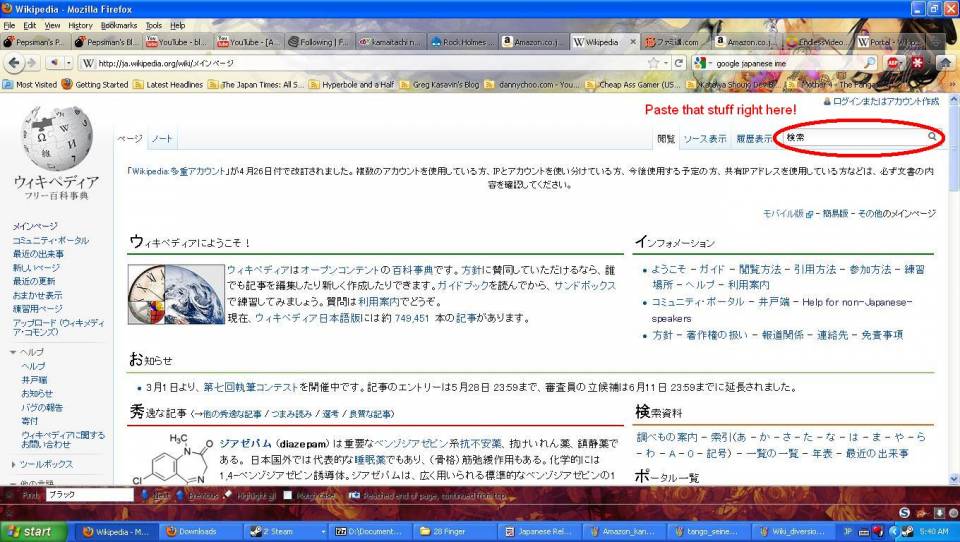
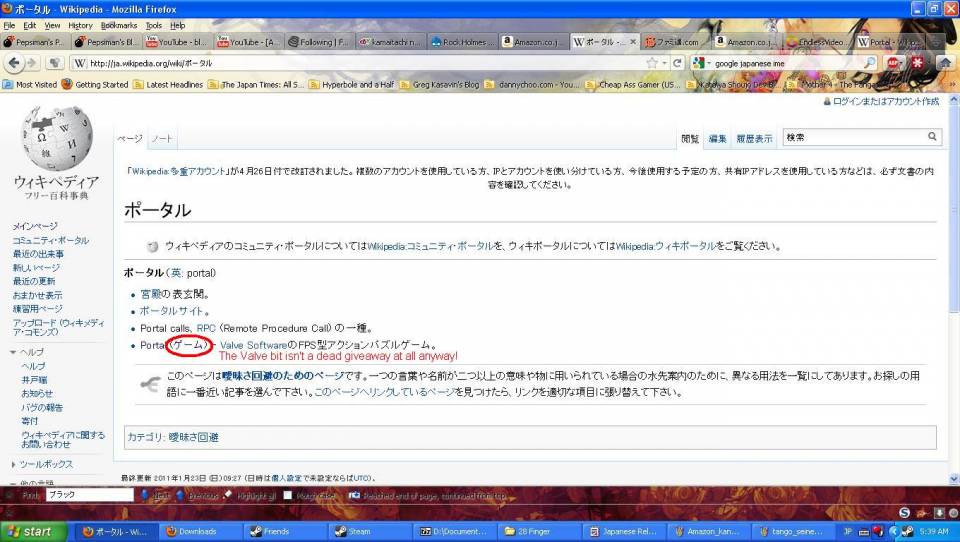
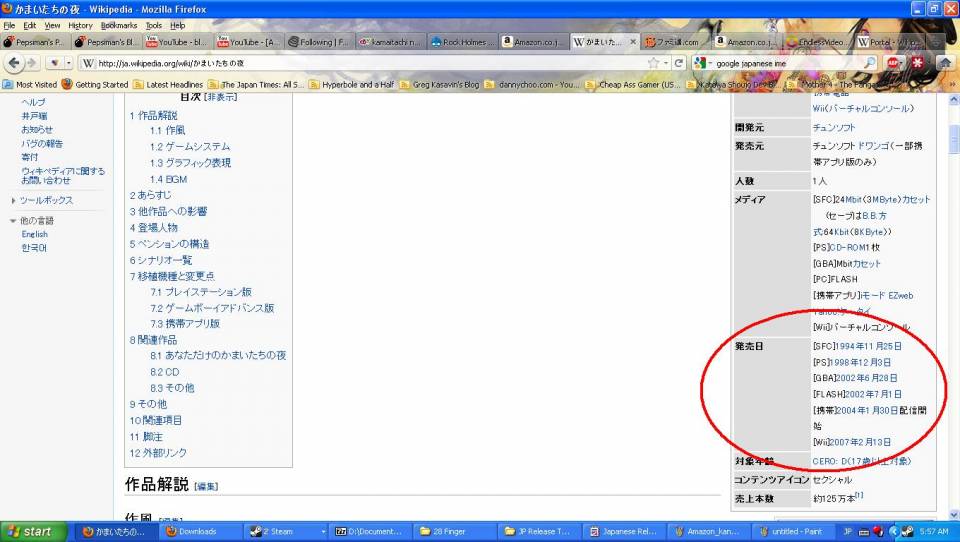
Famitsu
Say what you will about their review practices, but given the fact that the magazine has been around since the Famicom days, if nothing else, it should have a pretty good grasp on game release dates for games from the last 30-ish years, which it does on its web site right here. Navigating the front page is only slightly trickier than Wikipedia's since there are two search fields instead of the typical one. However, for our purposes, you always want to only use the one located on the right, which is specifically for looking up game titles. The other one is for searching articles in their archives. That's also handy in it's own right, but that's not what we're here for today. Just to make it that much more clear, I highlighted what I mean below. Just adhere to the circled area and you'll be okay.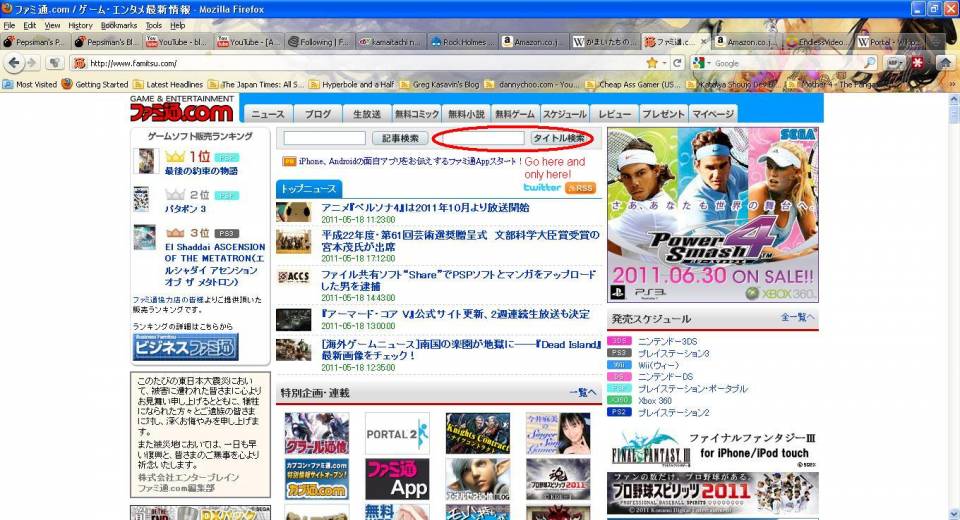
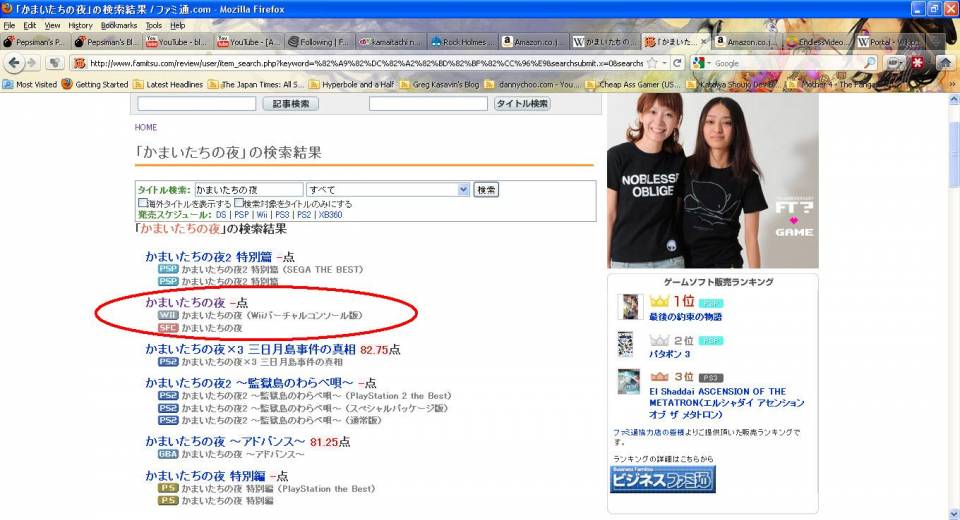
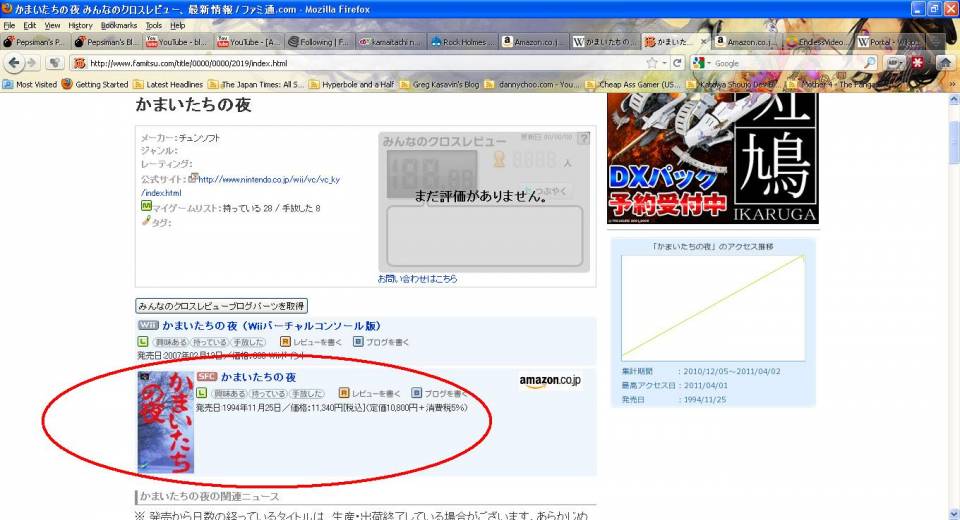
Amazon Japan
Last but not least for this guide is Amazon Japan. While Famitsu and Wikipedia will probably have you covered for Japanese release dates, Amazon Japan, which you can find here, isn't a slouch, either. Obviously, it hasn't been around as long as Famitsu, but it still does a respectable job of maintaining dates for retro games that are in its database, so there's no shame in looking up games there. To do that, it's more or less exactly like searching for games on other Amazon branches. You just type the Japanese name of the game into the search bar, which will then take you to the results. If you like, you can also use the drop-down menu on the left hand side to specify game results only by picking TVゲーム, but unless you're dealing with a series that has novel and anime spinoffs, it shouldn't be necessary. Once again, here's a nice picture of what I've been talking about, just in case somebody needs it.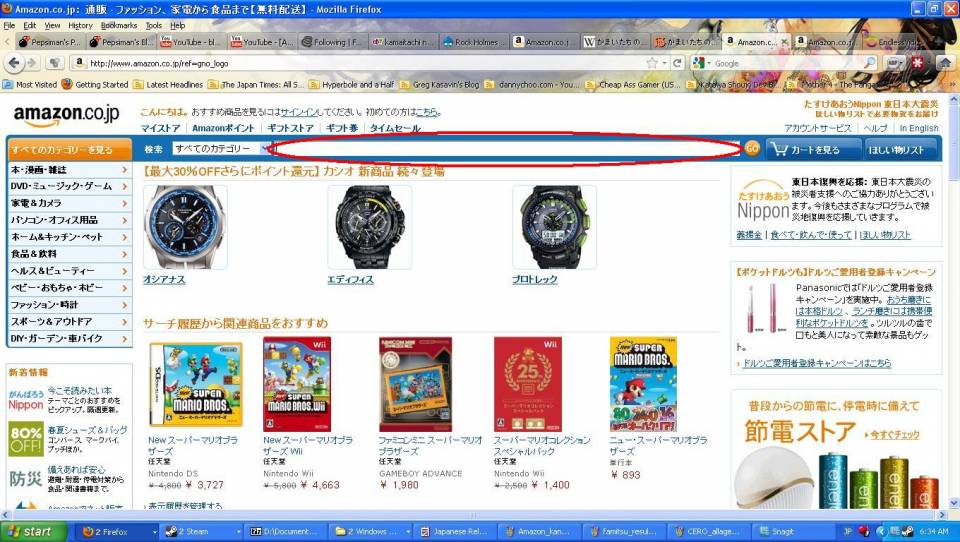
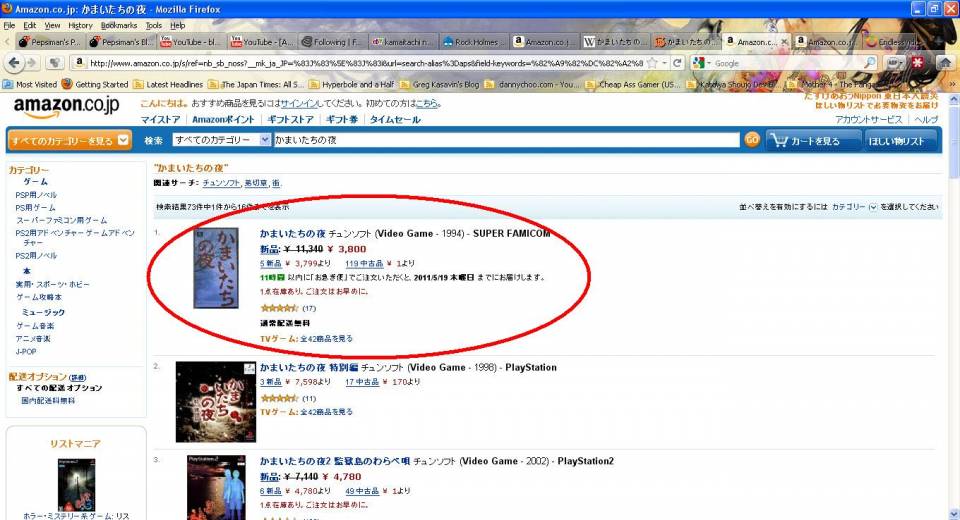
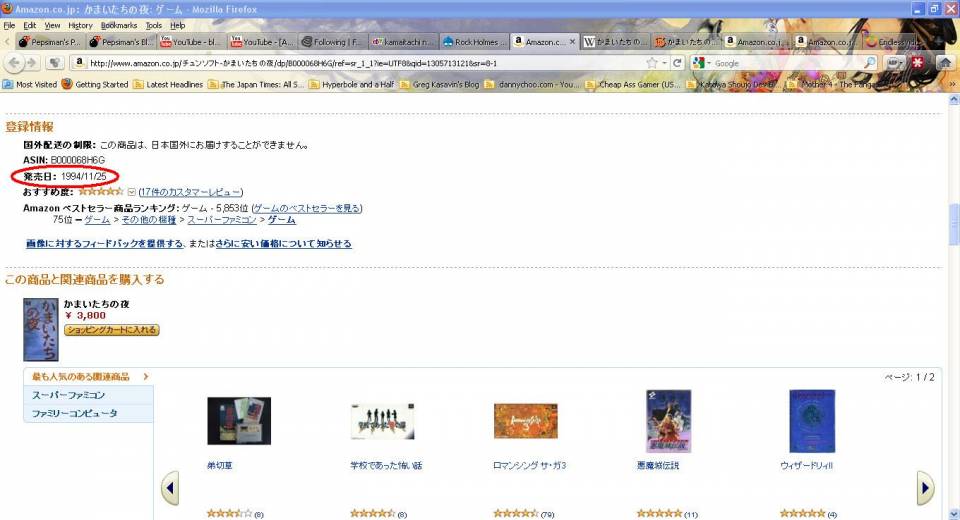
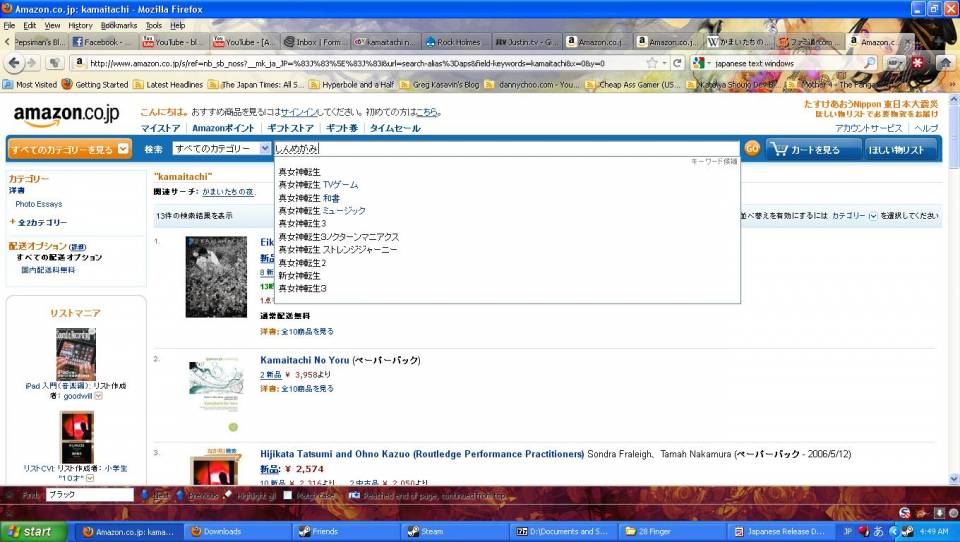
A Quick Note on Japanese Game Ratings
Much like American games, Japanese games didn't always have a rating board attached to them. A lot of older games, even those from the late 1990s, tend not to have ratings. Since CERO ratings are, like ESRB ones, always put on the front of the box, if you don't see one explicitly on the front of the box, it means the game wasn't rated and you can therefore leave that section blank when typing in release information here on GB. Otherwise, the ratings always use an English character that's in a bold white letter surrounded by a black rectangle. The one exception to this is the now outdated all ages rating, which is written in the kanji 全年齢. It has since been replaced by the "A" rating, but since releases on here allow you to choose all ages, it's worth noting. I've placed a larger version of the kanji below for easier viewing.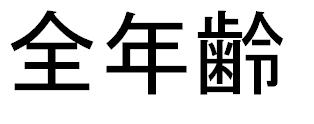
Conclusion
I know that this guide will probably only be useful to a select few who dutifully fill out release information for games on the GB wiki. However, I feel that it's important that non-Japanese speaking users be able to find that information for Japanese games when it's otherwise hard to find in English. As such, I hope this guide comes in handy for them. While I believe I've covered more or less everything necessary, if you have any comments, suggestions, or feedback, you are, of course, free to say them in the comments or in a PM. If I've substantially screwed up somewhere or there needs to be something else inserted, I am, of course, not against doing so. If you also need help looking for the Japanese name of a game or series, then I'll also be happy to help you and will give you the title in raw text.Thanks for reading!
-Pepsi
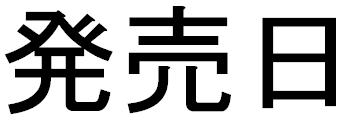

Log in to comment